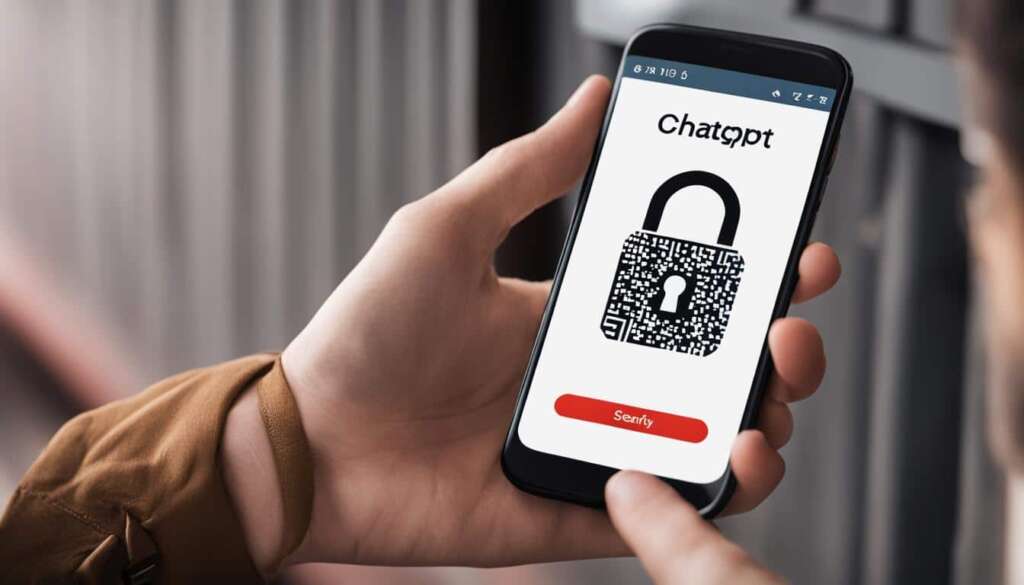Table of Contents
ChatGPT, a popular online service, has been gaining attention for its impressive language model capabilities. As part of its signup process, ChatGPT requires users to provide their phone number for verification purposes. This may raise questions about the need for such information and the associated security implications. Let’s dive into why ChatGPT insists on obtaining your phone number and how it contributes to a secure user experience.
The requirement to verify user accounts through a phone number is a standard practice known as two-factor authentication. This process is employed by various online services to ensure that accounts are created by real individuals and not automated bots. By including a phone number in the verification process, ChatGPT adds an extra layer of security to protect user information from unauthorized access.
Implementing two-factor authentication with a phone number enhances the overall security of ChatGPT and reduces the risk of fraudulent activity. It helps safeguard user accounts, ensuring a trusted and secure environment for interactions with the language model. ChatGPT aims to provide users with a safe and reliable platform for engaging in meaningful conversations.
It’s important to note that the phone number requirement is part of ChatGPT’s commitment to user safety. By upholding this security measure, ChatGPT helps to establish a trustworthy community and protect user privacy. However, it is worth noting that conversations with ChatGPT are saved and could potentially be accessed by unauthorized parties. Therefore, it is advisable to avoid sharing personal or sensitive information during your chats.
In conclusion, providing your phone number for verification when using ChatGPT helps to ensure the integrity of user accounts and create a secure environment for engaging with the language model. While concerns about privacy may arise, ChatGPT’s focus on user safety and adherence to privacy regulations, such as GDPR, provides reassurance regarding the handling of personal information. By following best practices and exercising caution when interacting with any online service, you can enjoy the benefits of ChatGPT while maintaining your privacy and security.
Why ChatGPT Requires a Phone Number
When signing up for ChatGPT, users are asked to provide their phone number as part of the account creation process. This requirement serves the purpose of implementing two-factor authentication, a widely adopted security measure in online services today.
Two-factor authentication adds an extra layer of security to verify the identity of users and protect against automated account creation and hacking attempts. By requesting a phone number, ChatGPT ensures that the individuals creating accounts are real users and not bots or spam accounts.
It’s worth noting that the phone number doesn’t need to be unique, meaning multiple email addresses can be linked to the same phone number. This flexibility allows users to associate multiple accounts with a single phone number, simplifying the account management process.
The primary goal of requiring a phone number is to ensure the utmost security of user accounts and to prevent fraudulent activity. This additional layer of verification helps safeguard user information and maintain a trusted environment within the ChatGPT community.
If you have any concerns about privacy or data protection, rest assured that providing your phone number to ChatGPT is considered safe. The requirement for a phone number primarily focuses on the account creation process and the implementation of two-factor authentication. OpenAI, the developers of ChatGPT, have made clear assurances that personal information obtained during signup will not be used for any other purposes.
Please note that while providing a phone number is a necessary step in the signup process for ChatGPT, it’s important to exercise caution when interacting with any online service. Avoid sharing personal or sensitive information during your conversations with ChatGPT, as the conversations are stored and could potentially be accessed by unauthorized parties.
Benefits of Two-Factor Authentication
“Two-factor authentication adds an extra layer of security to online accounts by requiring users to provide an additional piece of information to verify their identity.”
Implementing two-factor authentication, like with a phone number, significantly reduces the risk of unauthorized access and protects user accounts from potential security breaches. It acts as a deterrent to hackers and provides peace of mind for users, knowing that their data and conversations are more secure.
While providing a phone number may seem like an inconvenience, it’s a small trade-off for the added protection and security it offers. By requiring a phone number as part of the account creation process, ChatGPT demonstrates its commitment to providing a safe and trustworthy platform for users to engage with.
Comparison: ChatGPT vs Other Platforms
| Platforms | Phone Number Required | Two-Factor Authentication | Account Security |
|---|---|---|---|
| ChatGPT | Yes | Yes | High |
| Platform A | No | No | Low |
| Platform B | No | Yes | Medium |
This table provides a quick comparison of ChatGPT’s account security measures with two other platforms. While Platform A doesn’t require a phone number and lacks two-factor authentication, it offers lower account security. Platform B, on the other hand, has two-factor authentication but doesn’t require a phone number. ChatGPT stands out by combining both requirements, ensuring a higher level of account security.
Image: An illustration depicting the importance of phone number security.
Is it Safe to Give ChatGPT Your Phone Number?
Providing your phone number to ChatGPT is generally considered safe. Privacy concerns surrounding ChatGPT primarily stem from the way the language model was trained and the collection of massive amounts of data, rather than the requirement of a phone number for verification. OpenAI has made assurances that personal information obtained during the signup process will not be used for any other purposes.
However, it is advisable not to share personal information during chats with ChatGPT, as the conversations are saved and could potentially be accessed by unauthorized parties. It is important to exercise caution and follow best practices when interacting with any online service.
When it comes to privacy and safety, it is essential to consider relevant regulations. The General Data Protection Regulation (GDPR) is a European Union law that sets guidelines for the collection and processing of personal data. OpenAI, the organization behind ChatGPT, is committed to complying with GDPR requirements to protect user privacy and ensure the secure handling of personal information.
By adhering to the principles of privacy and data protection, OpenAI aims to prioritize user safety and maintain trust in its services. It is crucial to familiarize yourself with the privacy policies and terms of service provided by ChatGPT and similar platforms before providing any personal information.
Privacy and Data Protection
OpenAI takes privacy seriously and has implemented measures to safeguard user data and protect against unauthorized access. These measures include encryption, secure storage practices, and access controls. While it is generally safe to provide your phone number for ChatGPT verification, it is important to be aware of potential risks and exercise caution when interacting with the AI.
“The safety and privacy of our users are of utmost importance to us. We have implemented robust security measures to protect user data and ensure compliance with relevant privacy regulations.”
– OpenAI spokesperson
It is worth noting that although OpenAI has taken steps to prioritize user privacy and security, no system is entirely immune to potential vulnerabilities. As a user, it is crucial to remain vigilant and adopt good cybersecurity practices, such as using strong and unique passwords, enabling two-factor authentication, and regularly reviewing privacy settings.
Considering the sensitivity of personal information, it is recommended to stay cautious and evaluate the potential risks before sharing any sensitive data, regardless of the platform or service being used.
| Pros | Cons |
|---|---|
| Enhanced security through two-factor authentication | Potential access to saved conversations by unauthorized parties |
| Compliance with GDPR regulations | Reliance on OpenAI’s data handling and security practices |
| Heightened user trust and safety | Existence of potential vulnerabilities in any system |

Best Practices for Personal Information Protection
While providing your phone number for ChatGPT verification is generally safe, it is important to follow best practices to protect your personal information:
- Do not share sensitive personal information during conversations.
- Regularly review the privacy settings and policies of the platforms you use.
- Use strong and unique passwords for all your accounts.
- Enable two-factor authentication whenever available.
- Keep your device’s operating system and software up to date.
By exercising caution and staying informed, you can mitigate potential risks and ensure a secure online experience when using ChatGPT or any other online service.
Can I Use ChatGPT Without a Phone Number?
Unfortunately, using ChatGPT without providing a phone number for verification is not possible. This requirement is in place to ensure the security and integrity of user accounts. ChatGPT does not accept VoIP (Voice over Internet Protocol) numbers, meaning an active mobile number is necessary to complete the account verification process.
However, there are a few alternatives that can be explored. Some online SMS services claim to provide real numbers that avoid detection, which could be an option for users. These services allow you to receive verification codes without the need for a physical SIM card.
Alternatively, if the requirement of a phone number is a concern, there are other chatbot platforms available that do not require a phone number for account creation. These platforms offer similar functionalities and can be used as alternatives to ChatGPT.
It is important to note that while the use of a phone number is a necessary step in the signup process for ChatGPT, there are options available for those who prefer not to provide their personal phone number.
FAQ
Why does ChatGPT require your phone number?
ChatGPT requires your phone number for verification purposes as part of a two-factor authentication process. This is to ensure that the account is being created by a real person and to protect against automated account creation or hacking attempts.
Why does ChatGPT ask for a phone number during signup?
ChatGPT asks for a phone number during signup to implement two-factor authentication, which is a common practice in many online services. This helps verify the identity of users and protects against bots, spam accounts, and unauthorized access.
Is it safe to provide your phone number to ChatGPT?
Providing your phone number to ChatGPT is generally considered safe. Privacy concerns surrounding ChatGPT primarily stem from the way the language model was trained, rather than the phone number requirement. OpenAI has assured that personal information obtained during signup will not be used for other purposes. However, exercise caution and avoid sharing personal information during chats, as conversations are saved and could potentially be accessed by unauthorized parties.
Can I use ChatGPT without providing a phone number?
Unfortunately, it is not possible to use ChatGPT without providing a phone number for verification. The phone number requirement is in place to ensure the security and integrity of user accounts. However, there may be alternative chatbot platforms available that do not require a phone number for account creation.













